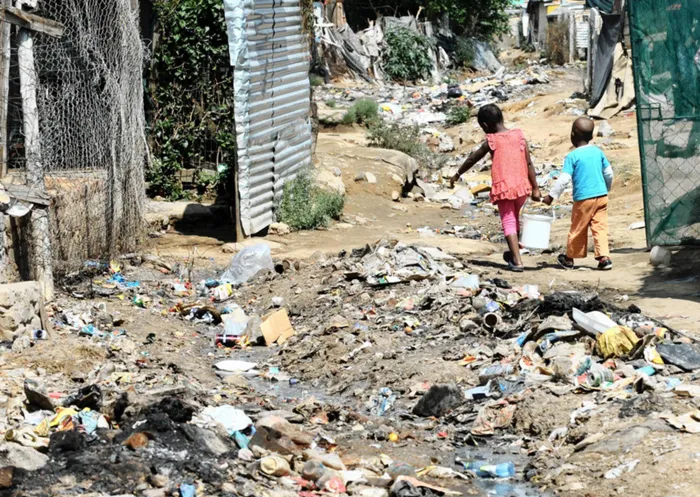
Diepsloot ext1. Informal workers in townships like Diepsloot earn 50% less than the national poverty line.
Image: File
South Africa’s middle class is vanishing, squeezed between opulence and poverty. In Johannesburg’s Sandton, where affluence defines the skyline, professionals are now allocating up to 20% of their monthly income just to get to work. Meanwhile, just 25 kilometres away in Diepsloot, informal workers, with little to no access to formal employment, live on a fraction of that income; far below the poverty line. Cape Town’s affluent Constantia offers 5-star healthcare just minutes from home, but in Khayelitsha, residents endure 4-hour waits for basic medical care in underfunded clinics. Once comprising 40% of the population in 2010, the middle class now accounts for only 35% of South Africa’s people, signalling a crisis not just of economic disparity, but of the structural inequities embedded deep within the country’s political and economic systems.
South Africa’s economy is growing, but not in a way that benefits the majority of its citizens. In Johannesburg, the middle class represents 16% of GDP, yet many find themselves squeezed by mounting costs. Transport alone takes up 20% of their monthly earnings, reflecting the larger structural problem: the rising cost of living amid stagnant wages. For comparison, over the last decade, real wages have dropped by 5%, with many workers now slipping back into poverty. De-unionisation has played a significant role in this shift, eroding the bargaining power that once protected the middle class.
Meanwhile, South Africa’s informal economy, which employs 25% of the population, faces unique challenges. Informal workers in townships like Diepsloot earn 50% less than the national poverty line, with only 15% of the population able to access formal jobs. The dissonance between the growth in the urban elite and the systemic exclusion of large swathes of the population only deepens the socio-economic divide. Johannesburg, for instance, has become a city divided, not only by its gleaming skyline but by the underlying inequities in access to economic opportunities.
Globally, the middle class is shrinking in 60% of developed economies, and South Africa is no exception. Its Gini coefficient (the global measure of income inequality) remains at an alarming 0.63, with the top 10% holding 65% of urban assets. This growing concentration of wealth in the hands of a few has led to increasing levels of inequality that threaten social cohesion and stability.
The failure of the government to provide equitable services is another key factor driving the erosion of the middle class. Cape Town, with its picturesque neighbourhoods, boasts near-perfect service delivery. However, just 10 kilometres away in the city’s townships, the reliability of basic services such as electricity and water drops drastically. In Constantia, 95% of residents enjoy stable electricity, while in Khayelitsha, only 55% have reliable power. This disparity is not just about comfort; it reflects the unequal distribution of resources that feeds into the larger socio-economic divide.
Service delivery failures are not limited to Cape Town. In Durban, floods regularly disrupt water supplies, affecting middle-class neighbourhoods for days, while business hubs recover 50% faster. The public sector’s inability to manage these critical services has forced the middle class to spend significant portions of their income on private alternatives, generators, water tanks, and even private healthcare. These growing inequalities are not mere inconveniences; they are pressing, daily realities for South Africa’s middle class.
Further exacerbating this divide is the rampant corruption that diverts R100 billion annually from the public purse, ensuring that the resources that could alleviate these disparities remain out of reach. With 65% of municipalities in financial distress, South Africa’s middle class is increasingly forced to fend for itself, while the rich are insulated from the impacts of these failures.
The digital and healthcare divides are equally significant in exacerbating South Africa’s inequality. In Cape Town, 85% of residents in affluent areas have reliable internet, but in townships like Khayelitsha, the figure drops to just 35%. Similarly, while the private healthcare system serves 60% of residents, only 10% of people in townships have access to the same quality of care. The digital divide limits entrepreneurial opportunities in townships, while the growing reliance on private healthcare is pushing middle-class families to spend up to 15% of their income on health insurance and medical bills.
Nationally, the digital economy accounts for 8% of South Africa’s GDP, yet 45% of the population lacks reliable internet access. This digital divide is a significant barrier to social mobility, especially for the middle class, who are often forced to pay exorbitant fees for private internet and healthcare. With public healthcare underfunded and understaffed, many middle-class families are faced with rising costs for basic services, further deepening their financial strain.
The growing disparities in access to both digital infrastructure and healthcare should not be overlooked. These gaps create an environment in which the middle class is becoming increasingly disconnected from critical resources necessary for upward mobility. Yet, despite widespread recognition of the need for investment in these sectors, progress has been slow, leaving the middle class to bear the brunt of this oversight.
At the core of these growing disparities lies institutional failure. South Africa’s governance structures, despite their experience, have failed to implement the necessary reforms to address inequality and promote inclusive growth. The country’s National Development Plan (NDP) has been slow to meet its targets, with only 20% of its objectives achieved. Infrastructure projects, which are vital for improving service delivery and creating economic opportunities, are consistently delayed. These failures reveal a government that is either unwilling or unable to address the issues that are causing the middle class to shrink and inequality to rise.
Corruption remains a major roadblock to progress. With only 2% of corruption cases resulting in convictions, the lack of accountability within the system undermines public trust and perpetuates the cycles of inequality that plague the country. As the middle class shrinks, frustration with the government’s inability to address these structural issues is rising. The recent wave of protests, with over 500 recorded in 2024, highlights the mounting dissatisfaction and the potential for social unrest if these issues are not addressed.
South Africa’s middle class is rapidly disappearing, squeezed by economic pressures, inequality, and failing public services. Without immediate reform, the collapse of the middle class could trigger a socio-economic eruption, exacerbating social unrest. As seen in countries like Chile, where middle-class decline triggered significant protests in 2019, South Africa’s extreme inequality, with a Gini coefficient of 0.63, makes it particularly vulnerable to this kind of unrest.
This is not just a South African issue; it is a global one. Countries grappling with similar issues of inequality must take heed of South Africa’s struggles. To rebuild an inclusive economy, governments must prioritise transparent budgets, enforce anti-corruption measures, and ensure that policies foster equitable access to jobs, services, and infrastructure. Without these reforms, the disappearance of the middle class is not only inevitable; it’s already unfolding.
South Africa’s future hinges on economic transformation that is inclusive of all its people, regardless of race or background. While some groups may feel marginalised in the current socio-economic landscape, it is essential to recognise that the suffering of any one group is, ultimately, the suffering of all South Africans. Inclusive economic growth is not a zero-sum game; when we elevate one group, we elevate the nation as a whole.
It is time to move beyond divisive narratives that fuel resentment and instead focus on shared prosperity. South Africa must embrace policies that not only rectify historical wrongs but also empower all groups to contribute to and benefit from the country’s growth. Only by working together, ensuring equitable access to jobs, services, and opportunities, can we hope to build a unified, sustainable future for the next generation.

Nomvula Zeldah Mabuza is a Risk Governance and Compliance Specialist with extensive experience in strategic risk and industrial operations. She holds a Diploma in Business Management (Accounting) from Brunel University, UK, and is an MBA candidate at Henley Business School, South Africa.
Image: Supplied
Nomvula Zeldah Mabuza is a Risk Governance and Compliance Specialist with extensive experience in strategic risk and industrial operations. She holds a Diploma in Business Management (Accounting) from Brunel University, UK, and is an MBA candidate at Henley Business School, South Africa.
*** The views expressed here do not necessarily represent those of Independent Media or IOL.
BUSINESS REPORT